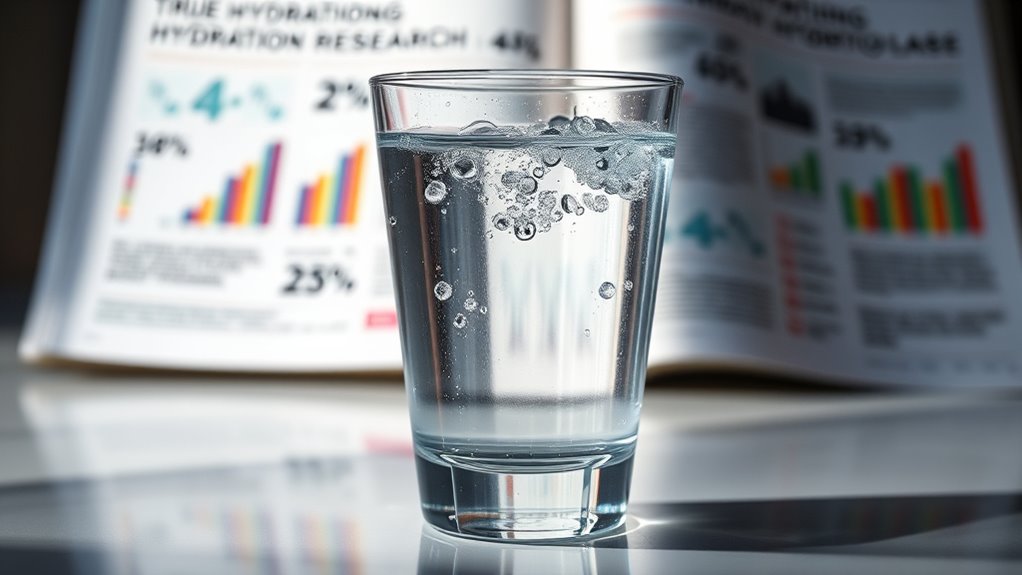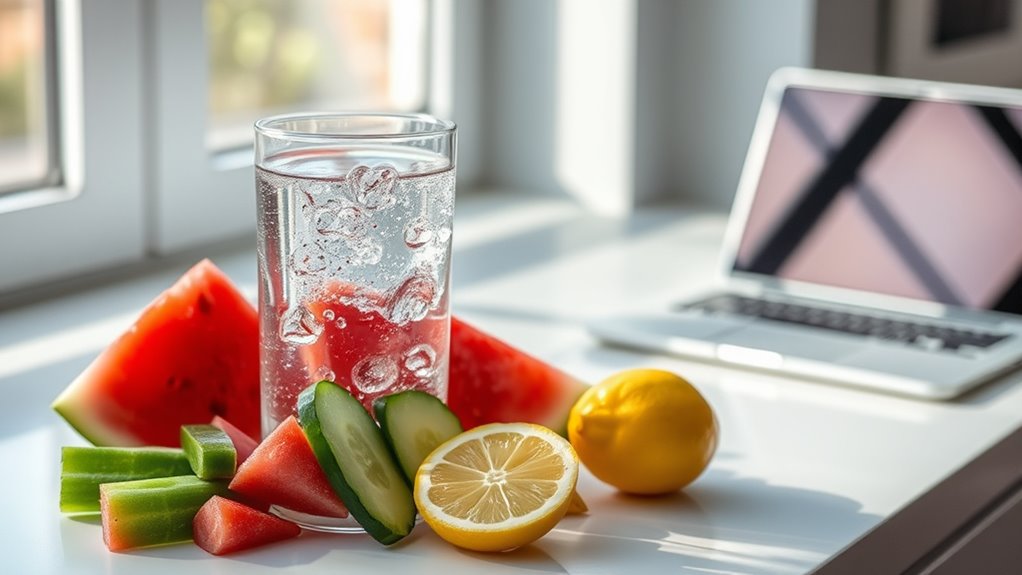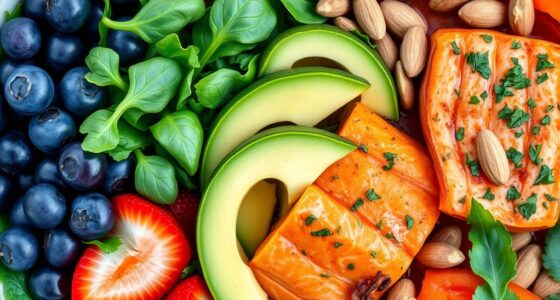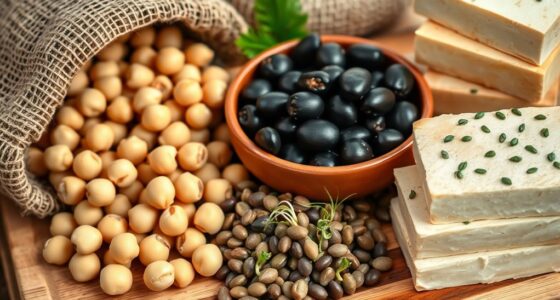Many hydration tips you’ve heard are outdated. New research shows that drinking water alone isn’t enough; your body needs a balance of electrolytes like sodium and potassium to stay properly hydrated. Relying only on thirst can be misleading since factors like age or health affect it. To optimize hydration, listen to your body and include electrolyte-rich foods or drinks. Keep exploring to discover how understanding these changes can improve your health.
Key Takeaways
- The “eight glasses of water daily” rule is outdated; hydration depends on individual needs, activity, and electrolyte balance.
- Electrolytes like sodium and potassium are essential for maintaining proper fluid levels, not just water intake.
- Thirst signals can be unreliable; urine color and electrolyte status are better hydration indicators.
- Proper hydration involves balancing electrolytes, especially during intense activity or hot weather, rather than drinking water alone.
- New research emphasizes personalized hydration strategies over generic rules, promoting smarter, health-conscious habits.

Have you ever wondered if all the common advice about staying hydrated is really true? For years, we’ve been told that drinking eight glasses of water a day is the key to maintaining good health. But recent research suggests that hydration isn’t as simple as hitting a specific water intake target. Instead, your body’s ability to regulate fluids depends on more complex factors like electrolyte balance and thirst regulation. These elements are essential in understanding how your body manages hydration, and they challenge some of the long-held hydration myths.
Electrolytes, such as sodium, potassium, and chloride, play a critical role in maintaining fluid balance within your body. They help your cells absorb water and ensure that your tissues don’t become either dehydrated or waterlogged. When electrolyte levels are off, your thirst signals might become unreliable, leading you to either drink too little or too much. This is why simply drinking water without considering electrolyte intake can sometimes fall short—your body needs the right mix to stay properly hydrated. Recent studies show that replenishing electrolytes is often more effective than just increasing water consumption, especially during intense exercise or hot weather, where electrolyte loss through sweat is significant.
Electrolytes are vital for fluid balance and effective hydration.
Thirst regulation is another key factor that many overlook. Your body’s thirst mechanism is finely tuned to signal when you need fluids, but it doesn’t always work perfectly. Factors like age, medication, or health conditions can dull your thirst response, making you less aware of when you’re actually dehydrated. Conversely, some people might feel thirsty even when they’re already well-hydrated, leading to overdrinking. These variations mean that relying solely on thirst to guide your hydration might not be the best approach. Instead, paying attention to other signs—such as the color of your urine, which should be light yellow—can be more reliable. Clear urine might mean overhydration, while dark urine indicates a need for more fluids.
New research underscores that hydration strategies should be personalized. Instead of adhering to a fixed water intake rule, listen to your body’s signals and consider your activity level, environment, and diet. If you’re engaging in strenuous activity or sweating heavily, balancing electrolytes becomes even more important. Incorporating drinks with electrolytes or foods rich in minerals can help maintain ideal hydration and prevent disruptions in electrolyte balance. Recognizing that thirst isn’t always a perfect indicator allows you to stay proactive about hydration, ensuring your body functions smoothly. Additionally, understanding how electrolytes influence hydration can help you optimize your intake for better health outcomes. By understanding these factors, you’re better equipped to debunk outdated hydration myths and adopt smarter, more effective hydration habits.
Frequently Asked Questions
Can Hydration Levels Affect Mental Clarity and Concentration?
Your hydration levels directly impact your mental clarity and concentration. When you’re dehydrated, you may experience brain fog, making it harder to focus and think clearly. Proper hydration supports ideal cognitive function, helping you stay alert and sharp throughout the day. Drinking enough water keeps your brain functioning smoothly, reducing mental fatigue, and enhancing your ability to concentrate. So, staying well-hydrated is key for maintaining mental sharpness and clarity.
Are Sports Drinks Necessary for Proper Hydration During Exercise?
Think of your body as a car needing the right fuel—sports drinks can help, but aren’t always necessary. During exercise, your sweat rate and electrolyte balance are key. If you’re sweating heavily or for long periods, a sports drink can replenish lost electrolytes and maintain hydration. For shorter workouts, water usually suffices. Listen to your body and adjust based on your activity level and how much you sweat.
Does Drinking Water Before Bed Impact Sleep Quality?
You might wonder if bedtime hydration affects sleep quality. Drinking water before bed can help prevent dehydration overnight, but too much might cause frequent bathroom trips, disrupting your sleep. To improve sleep quality, aim for moderate hydration without overdoing it. Finding the right balance guarantees you’re well-hydrated without disturbing your rest. So, consider your body’s signals and adjust your bedtime hydration accordingly for better sleep.
Can Overhydration Be as Dangerous as Dehydration?
Imagine your body as a delicate balance beam, where overhydration tips it dangerously. Yes, overhydration can be as risky as dehydration. Excess water dilutes your electrolytes, disrupting electrolyte balance and stressing your kidneys. This can lead to hyponatremia, causing confusion or seizures. Staying mindful of your hydration helps maintain ideal kidney function and keeps your body’s internal harmony intact, preventing the dangers of both too little and too much water.
How Does Hydration Influence Skin Health and Aging?
Hydration plays a crucial role in skin health and aging. When you stay well-hydrated, it helps maintain skin elasticity and promotes collagen synthesis, making your skin look plump and youthful. Proper hydration reduces the appearance of fine lines and wrinkles, keeping your skin smoother and more resilient. So, drinking enough water regularly supports your skin’s overall health and slows down aging signs, giving you a fresher, more radiant complexion.
Conclusion
Now that you know these hydration myths are just that—myths—it’s time to rethink what you’ve believed. Staying properly hydrated isn’t about drinking endless water, but about listening to your body’s true needs. With new research changing everything, aren’t you ready to ditch old habits and hydrate smarter? Remember, hydration isn’t one-size-fits-all. So, why settle for myths when the facts can help you feel your best every day?









